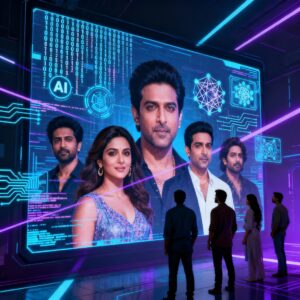In the last few months, several Indian celebrities, including Amitabh Bachchan, Aishwarya Rai Bachchan, Kumar Sanu, Jackie Shroff, Anil Kapoor, and even spiritual figures like Sri Sri Ravi Shankar, have approached the Delhi High Court seeking protection of their personality rights against unauthorised use of their faces, voices, and mannerisms.
What’s the trigger? The growing misuse of artificial intelligence (AI) to generate deepfakes, endorsements, and fake advertisements without consent.
What are Personality Rights
Let’s understand what Personality Rights are in the first place, and are there any laws on Personality Rights in India?
Personality rights safeguard individual control over their identity, i.e. name, image, voice, signature and likeness, when used publicly or commercially. These rights have two major components- The Right to Publicity, which prevents commercial misuse without consent, and The Right to Privacy, which guards against deepfakes, morphed visuals, and fake endorsements.
While there are no specific laws on personality rights in India, however, the courts, through judicial interpretation, recognise them as part of the right to privacy and dignity under Article 21 of the Constitution and also use existing laws like the Copyright Act, 1957; Trade Marks Act, 1999 and common-law remedies such as passing off.
The Legal Backdrop in India
A landmark moment came with Amitabh Bachchan v. Rajat Nagi (2022), where the Delhi High Court restrained several entities from using the actor’s name, image, and voice for commercial purposes without his consent. The Court recognised that a celebrity’s persona carries immense commercial and emotional value, and its unauthorised exploitation violates both privacy and publicity interests.
Similar protection was later extended to Anil Kapoor, Jackie Shroff, and Aishwarya Rai Bachchan, as the Court reiterated that the misuse of a person’s identity in AI-generated content, fake advertisements, or voice imitations amounts to infringement of personality rights.
With the rise of such suits, one of the biggest challenges is identifying the perpetrators. Many of these videos or images are created and shared anonymously, often from foreign IP addresses or by using multiple social media platforms. The creators may never reveal their real identity. Hence, to address this, courts have started using “John Doe” orders (also called anonymous injunctions) representing all unknown perpetrators until their real identities are revealed.
The Need for a Comprehensive AI Framework
While John Doe orders provide a temporary solution, they are insufficient for long-term prevention. The rise of AI-generated deepfakes exposes the limitations of India’s existing legal framework. Currently, courts rely on a combination of the Information Technology Act, 2000, relevant IPC provisions (like Sections 354C, 509), and personality rights jurisprudence to address violations. However, these laws were never designed to address AI-generated impersonation, synthetic content, or the rapid virality of digital material.
Without a dedicated AI and deepfake regulation, victims, whether celebrities or ordinary citizens alike, remain vulnerable.
Globally, some jurisdictions have begun experimenting with deepfake-specific legislation. For example, the U.S. has laws criminalising non-consensual sexual deepfakes, while the EU is exploring accountability frameworks for AI content. India’s legal system, in contrast, is still relying on old statutes applied creatively by courts.
Key measures could include:
- Clear criminalisation of non-consensual AI-generated content.
- Rapid takedown mechanisms on social media and digital platforms
- Mechanisms for rapid redress and evidence preservation protocols.
- Clear penalties for both creators and distributors of harmful AI content.
Conclusion
As India navigates this new frontier, one thing is clear: our laws need to keep up with the pace of the evolution of technology. Otherwise, in a world where machines can clone faces, voices, and personas with ease, our very sense of identity is at risk. Protecting it isn’t just a legal formality anymore, but a necessity for everyone.
As technology blurs the boundary between authenticity and imitation, legislative codifications are needed at the hour.
References
- Desk, T.T., 2025. After Aishwarya and Abhishek Bachchan, Akshay Kumar in court: Explained why Bollywood celebrities are going to court to protect their personality rights on Facebook, Instagram, YouTube and other social media platforms. The Times of India [online]. Available at: Link [Accessed 21 October 2025].
- Desk, T.T., 2025. Hrithik, Aishwarya, Akshay, Amitabh: Why Bollywood stars are approaching courts across the country. The Economic Times [online]. Available at: Link[Accessed 21 October 2025].
- Patel, R., 2025. What are the personality rights of celebrities in India? Hrithik Roshan, Akshay Kumar’s lawsuits explained. SCC Online [online]. Available at: Link [Accessed 21 October 2025].


